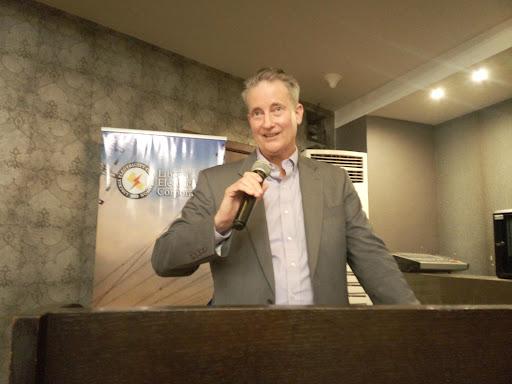Liberia: “US Embassy Did Send A Diplomatic Note,” But…

US Ambassador Michael McCarthy
Since September 12, following news reports in the Daily Observer and other outlets that the Embassy of the United States of America near Monrovia allegedly sent the Ministry of Foreign Affairs a diplomatic note requesting a sample of the national voter registration card, the Embassy has sought to clarify the issue.
But when the Embassy has repeatedly told journalists in the past that it does not comment on government-to-government communications, the case for clarity can be a tall order.
The Embassy’s alleged request was conveyed through a letter signed by the Acting Minister of Foreign Affairs, Thelma Duncan Sawyer, to the National Elections Commission, calling for the requested specimen. A leaked copy of Acting Minister Sawyer’s letter to the NEC landed in the possession of the Observer — a serendipitous piece of evidence to inform our investigative report on the procurement for the biometric voter registration (VR) cards by the NEC.
“I present my compliments and wish to inform you that the Ministry has received a diplomatic note from the Embassy of the United States of America, requesting a specimen of the national voter registration card,” said the letter, signed by Sawyer, Deputy Minister of Administration at the Ministry of Foreign Affairs. “The Ministry looks forward to your kind response to the said request in order to revert to the Embassy in a timely manner.”
Sawyer’s letter did not explain why the Embassy requested the specimen. However, Sawyer did confirm to the Daily Observer that she wrote the letter to NEC in her capacity as Acting Minister of Foreign Affairs. “Yes, it was written by me,” she attested. “The American Embassy wrote a letter requesting it.”
But on September 12, the Embassy issued a press statement denying having ever requested from the Republic of Liberia a sample or specimen of the 2023 national voter registration card.
“The U.S. Embassy in Monrovia has seen the reporting on the NEC’s Biometric VR System and would like to correct the record,” the Embassy’s September 12 press statement said. “At no point in time did the Embassy send the Ministry of Foreign Affairs of the Republic of Liberia an official Diplomatic Note, or any other communication, with the request to acquire a sample or specimen of the 2023 national voter registration card.”
At this statement, there were speculations among the public that Acting Minister Sawyer had fabricated a U.S. diplomatic note in the middle of a highly contentious elections-related procurement process.
And who could blame them? In the context of a slew of U.S. Treasury sanctions targeted powerful government officials for corruption and human rights abuses, and with public concerns piqued about possible electoral fraud ahead of the 2023 elections, the issue of the diplomatic note — fact or fictitious — was no small matter.
Following publication of their previous statement, the Embassy issued a new statement on Wednesday, September 14, expressing the need to further clarify, yet holding on to its original statement.
Diplomatic note exists
“That statement is correct,” the Embassy said Wednesday. “However, we wish to issue a clarification.
“In July of this year, the Embassy did send the Ministry of Foreign Affairs a Diplomatic Note, as part of its routine diplomatic correspondence, requesting fully completed sample specimens of travel, identity, and other official documents issued by Liberia. The Department of State makes this request to all countries in the world as part of our continuing effort to prevent fraudulent use of international travel, identity, and civil documents. The Ministry of Foreign Affairs correctly passed this request to the various government entities responsible for producing those documents, including the National Elections Commission (NEC).”
The first key takeaway in the Embassy’s latest statement is that it did not specifically request the specimen pertaining to the pending biometric VR cards that are still under consideration for the 2023 elections process.
The Embassy’s request for the VR specimen — which we now know the authenticity of, so to speak — appears to be a “routine” exercise of updating its database with any and all forms of national identification documents issued by a country to its citizens and foreign residents.
It is a known fact that banking institutions in Liberia, for instance, require some form of national identification for an individual to conduct banking transactions. A customer may present their driver’s license, national ID card, passport, or voter registration card, all of which have been deemed valid in Liberia for banking transactions.
But the Embassy’s latest statement suggests that it needs the latest updated specimen of each of these national documents in its own database for a variety of functions, including its immigration fraud detection mechanism.
The other key takeaway: Deputy Minister Sawyer, through her correspondence to the NEC, did no wrong, the Embassy says.
“The letters published in the press from the Ministry of Foreign Affairs are neither forged nor nefarious, but rather routine diplomatic correspondence that had no connection to the NEC’s important work in procuring new biometric voting systems.”
